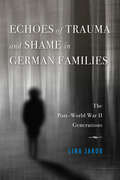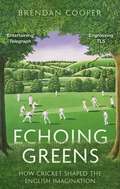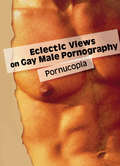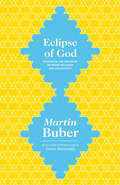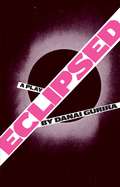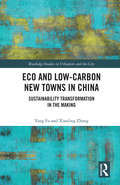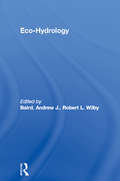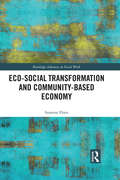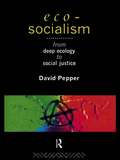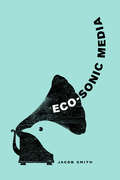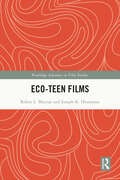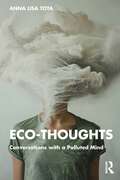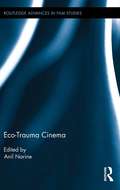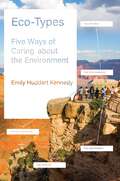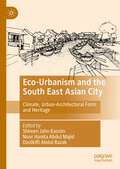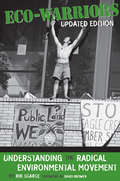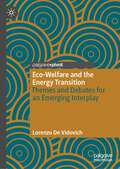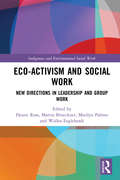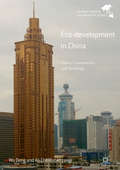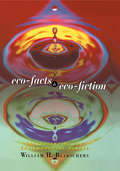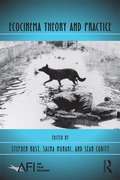- Table View
- List View
Echoes of Trauma and Shame in German Families: The Post–World War II Generations
by Lina JakobHow is it possible for people who were born in a time of relative peace and prosperity to suddenly discover war as a determining influence on their lives?For decades to speak openly of German suffering during World War II—to claim victimhood in a country that had victimized millions—was unthinkable. But in the past few years, growing numbers of Germans in their 40s and 50s calling themselves Kriegsenkel, or Grandchildren of the War, have begun to explore the fundamental impact of the war on their present lives and mental health. Their parents and grandparents experienced bombardment, death, forced displacement, and the shame of the Nazi war crimes. The Kriegsenkel feel their own psychological struggles—from depression, anxiety disorders, and burnout to broken marriages and career problems—are the direct consequences of unresolved war experiences passed down through their families.Drawing on interviews, participant observation, and a broad range of scholarship, Lina Jakob considers how the Kriegsenkel movement emerged at the nexus between public and familial silences about World War II, and critically discusses how this new collective identity is constructed and addressed within the framework of psychology and Western therapeutic culture.
Echoing Greens: How Cricket Shaped the English Imagination
by Brendan CooperThe importance of cricket to England has been immortalised in the art and literature of a thousand years. For countless artists and writers across the centuries, the culture and aesthetics of cricket - white-clad players, the crack of bat on ball, booming appeals, admiring applause, figures running up to bowl, batsmen leaning, waiting, swinging the blade - have been as essential to the English landscape as the hills and meadows immortalised by Gainsborough, Constable and Turner.It is a story that is known in part, but one that has never been explored in full. And it is lined with surprises, forgotten tales and unnoticed details - ranging from medieval manuscript illustrations, through a dazzling variety of visual art, poetry, fiction and drama, to recent portraits of contemporary heroes.Echoing Greens is a fascinating and thoughtful exploration of the bond between cricket and the English imagination. It unveils that beneath cosy patriotic dreams of 'English values', a much wilder, more complex story exists. Alongside stories of heroic figures, noble values, and pastoral idylls, the literature and the art of cricket also tell of vice, violence, and scandal. The result is a thrilling investigation into the true story behind these representations of the game, and forces us to reconsider the history of cricket itself.
Echoing Greens: How Cricket Shaped the English Imagination
by Brendan CooperThe importance of cricket to England has been immortalised in the art and literature of a thousand years. For countless artists and writers across the centuries, the culture and aesthetics of cricket - white-clad players, the crack of bat on ball, booming appeals, admiring applause, figures running up to bowl, batsmen leaning, waiting, swinging the blade - have been as essential to the English landscape as the hills and meadows immortalised by Gainsborough, Constable and Turner.It is a story that is known in part, but one that has never been explored in full. And it is lined with surprises, forgotten tales and unnoticed details - ranging from medieval manuscript illustrations, through a dazzling variety of visual art, poetry, fiction and drama, to recent portraits of contemporary heroes.Echoing Greens is a fascinating and thoughtful exploration of the bond between cricket and the English imagination. It unveils that beneath cosy patriotic dreams of 'English values', a much wilder, more complex story exists. Alongside stories of heroic figures, noble values, and pastoral idylls, the literature and the art of cricket also tell of vice, violence, and scandal. The result is a thrilling investigation into the true story behind these representations of the game, and forces us to reconsider the history of cricket itself.
Eclectic Views on Gay Male Pornography: Pornucopia
by Todd MorrisonA unique, multifaceted look at the meaning (and the specifics) of gay male pornographyOpen any "gay lifestyle" magazine (even the serious ones) or go to any gay bar, and you&’re likely to encounter something related to pornography, be it an image of a porn "superstar" or advertisements for pornographic magazines, DVDs, calendars, etc. Eclectic Views on Gay Male Pornography Pornucopia examines this phenomenon with a series of provocative essays, in which experts in history, law, media studies, and psychology, as well as laypeople and gay porn insiders explore the complex world of male pornography and the various ways in which it has permeated gay culture-from the 1970s until today.This first-of-its-kind book examines the phenomenon of self-writing and performance for gay men in the last century, specifically looking at the lives of modern-day performance artist Tim Miller, who has received national recognition for his one-man shows portraying his struggles as a gay man; Wakefield Poole (born 1936), the first producer of gay pornography (Bijou, Boys in the Sand) in the era accompanying the emergence of the gay rights movement; gay adult film icon Scott "Spunk" O&’Hara (born 1961); and Aaron Lawrence (born 1971), who worked as a gay escort, actor, and producer/director of his own sexually explicit "amateur" videos.In this groundbreaking analysis of gay men&’s relationship with pornography, you&’ll also learn about: gay pornography and the messages it carries about intimacy, body image, and hegemonic masculinity representations of ethnicity in gay pornography gay pornography and safer sex gay pornography and censorship viewers&’ perceptions of gay pornography gay pornography and internalized homophobia, misogyny, and body fascism changes in the way gay pornography is produced and performed-from the 1970s through the 1990s the meaning of the recurring settings in American gay pornographic videos: prison, the military, and other all-male environments; and recurring themes: leather, S/M, dissatisfaction with heterosexual life, initiation into gay life, etc. In addition, Eclectic Views on Gay Male Pornography presents two fascinating chapters about the case of Little Sisters Book and Art Emporium in Vancouver. In this landmark case, the Canadian Supreme Court was asked to determine whether gay male pornography violated the sex equality protections guaranteed by the Canadian Charter of Rights and Freedoms. The court also examined the way that Canada Customs treats international shipments to gay and lesbian bookstores. In addition, the book provides a revealing insider&’s perspective on the gay adult video industry that contrasts the workaday reality of making porn with the glamorous mythology of the skin trade.
Eclipse of God
by Martin Buber Leora BatnitzkyBiblical in origin, the expression "eclipse of God" refers to the Jewish concept of hester panim, the act of God concealing his face as a way of punishing his disobedient subjects. Though this idea is deeply troubling for many people, in this book Martin Buber uses the expression hopefully--for a hiding God is also a God who can be found. First published in 1952, Eclipse of God is a collection of nine essays concerning the relationship between religion and philosophy. The book features Buber's critique of the thematically interconnected--yet diverse--perspectives of Soren Kierkegaard, Hermann Cohen, C.G. Jung, Martin Heidegger, and other prominent modern thinkers. Buber deconstructs their philosophical conceptions of God and explains why religion needs philosophy to interpret what is authentic in spiritual encounters. He elucidates the religious implications of the I-Thou, or dialogical relationship, and explains how the exclusive focus on scientific knowledge in the modern world blocks the possibility of a personal relationship with God. Featuring a new introduction by Leora Batnitzky, Eclipse of God offers a glimpse into the mind of one of the modern world's greatest Jewish thinkers.
Eclipse: A Nightmare
by Hugues De MontalembertEclipse is the autobiographical work by a young artist living in New York. It describes, from the evening he was attacked and lost his sight, the two years it took to him to go back to Life and swim freely in the sea of Java. 'I had to give birth to myself.' The beautiful, unpredictable and eccentric ballerina, Valouchka, leads him into the reconquest of the dance with life. Hospital, Rehabilitation Centre, joy, despair, love. and one morning, he closes the door behind and flies alone to Indonesia. 'Fear is the true Blindness'. You experiment in those pages a deep meditation on life, love, perception, visual world and inner vision. Poignant, poetic and sometimes hilarious, this book is a Song to Life, which questions all of us.
Eclipsed
by Danai Gurira"[Eclipsed is] a surprisingly vivacious portrait of helplessness, of the entirely human impulse to adapt, to get by even when there's little hope life will get better."--Washington Post "Eclipsed depicts the harsh realities of women's lives in a strife-torn African country with both a clear eye and a palpable empathy."--New York Times Four women in Liberia struggle to survive conditions on a rebel army base. Held as the concubines of a warlord, each "wife" must find her own means of coping amidst a situation that appears hopeless. With frail, fractured identities born from an ongoing, senseless civil war, the women build their own contained world to guard against the chaos outside. This enthralling work from award-winning playwright and actress Gurira demonstrates the human capacity to endure, even in the most desolate of circumstances. Danai Gurira's other plays include Familiar and In the Continuum, written for World AIDS Day in December 2011, which she co-wrote and co-starred in with Nikkole Salter. For In the Continuum, she was awarded an Obie Award, Outer Critics' Circle Award, and a Helen Hayes Award for her performance. She received a Whiting Writer's Award in 2012. She is best known for her role as Michonne in the hit television series, The Walking Dead.
Eclipsed
by Danai Gurira"[Eclipsed is] a surprisingly vivacious portrait of helplessness, of the entirely human impulse to adapt, to get by even when there's little hope life will get better."--Washington Post "Eclipsed depicts the harsh realities of women's lives in a strife-torn African country with both a clear eye and a palpable empathy."--New York Times Four women in Liberia struggle to survive conditions on a rebel army base. Held as the concubines of a warlord, each "wife" must find her own means of coping amidst a situation that appears hopeless. With frail, fractured identities born from an ongoing, senseless civil war, the women build their own contained world to guard against the chaos outside. This enthralling work from award-winning playwright and actress Gurira demonstrates the human capacity to endure, even in the most desolate of circumstances. Danai Gurira's other plays include Familiar and In the Continuum, written for World AIDS Day in December 2011, which she co-wrote and co-starred in with Nikkole Salter. For In the Continuum, she was awarded an Obie Award, Outer Critics' Circle Award, and a Helen Hayes Award for her performance. She received a Whiting Writer's Award in 2012. She is best known for her role as Michonne in the hit television series, The Walking Dead.
Eco Soma: Pain and Joy in Speculative Performance Encounters (Art After Nature)
by Petra KuppersModeling a disability culture perspective on performance practice toward socially just futures In Eco Soma, Petra Kuppers asks readers to be alert to their own embodied responses to art practice and to pay attention to themselves as active participants in a shared sociocultural world. Reading contemporary performance encounters and artful engagements, this book models a disability culture sensitivity to living in a shared world, oriented toward more socially just futures.Eco soma methods mix and merge realities on the edges of lived experience and site-specific performance. Kuppers invites us to become moths, sprout gills, listen to our heart&’s drum, and take starships into crip time. And fantasy is central to these engagements: feeling/sensing monsters, catastrophes, golden lines, heartbeats, injured sharks, dotted salamanders, kissing mammoths, and more. Kuppers illuminates ecopoetic disability culture perspectives, contending that disabled people and their co-conspirators make art to live in a changing world, in contact with feminist, queer, trans, racialized, and Indigenous art projects. By offering new ways to think, frame, and feel &“environments,&” Kuppers focuses on art-based methods of envisioning change and argues that disability can offer imaginative ways toward living well and with agency in change, unrest, and challenge.Traditional somatics teach us how to fine-tune our introspective senses and to open up the world of our own bodies, while eco soma methods extend that attention toward the creative possibilities of the reach between self, others, and the land. Eco Soma proposes an art/life method of sensory tuning to the inside and the outside simultaneously, a method that allows for a wider opening toward ethical cohabitation with human and more-than-human others.
Eco and Low-Carbon New Towns in China: Sustainability Transformation in the Making (Routledge Studies in Urbanism and the City)
by Xiaoling Zhang Yang FuThis book examines the sustainability transition theory in the context of urbanization in China, tracing the development of eco and low-carbon cities. It examines how ideas on building eco-cities and low-carbon cities travel from nation to nation, how they are adopted in the Chinese administrative context and what role inter-scalar actors play in getting the ideas transferred, translated and operationalized on the ground. Offering an overarching theoretical framework that incorporates all urban sustainability experiments in China, the book conducts a comprehensive analysis of the master plans of these new towns and summarizes the normative transition targets of sustainable urban experiments. It explores how they differ from each other and how they influence transition dynamics in practice. By examining four eco and low-carbon new towns deemed representative of current major approaches to sustainability transition management in China, the book provides a detailed depiction of generic transition management and explains the different transitional trajectories for each type of sustainable urban experiment. It demonstrates how subnational-level and city-level transitions mediate the national transition. Through a thorough inquiry into inter-scalar dynamics, institutional arrangements and techno-social innovations in sustainable urban experiments, the book links generalized transition rules and specific contexts to present a full view of the challenges, failures and territorial problems of eco and low-carbon new towns. This book makes a novel contribution to the study of Chinese urbanization by revisiting issues and problems of contemporary urban China. The reflection on these urban issues will provide implications to policymakers, professionals and the common reader interested in the future sustainable urbanism in China.
Eco-Hydrology
by Andrew J. Baird Robert L. Wilby^iEco-Hydrology is the first book to offer an overview of the complex relationships between plants and water across a wide range of terrestrial and aquatic environments. Leading ecologists and hydrologists present reviews of the eco-hydrology of drylands, wetlands, temperate and tropical rain forests, streams, and rivers and lakes. Contents include:* background information on the water relations of plants, from individual cells to strands of plants* the role of mathematical models in eco-hydrology* explanations of how plants affect patterns and rates of water movement and storage in a range of terrestrial and aquatic ecosystems.
Eco-Social Transformation and Community-Based Economy (Routledge Advances in Social Work)
by Susanne ElsenWorldwide societal problems such as mass unemployment, growing social disparities, public and private poverty, social exclusion, environmental destruction and the evidence of climate change are increasing and becoming ever more visible. They require urgent and sustainable long-term solutions. Eco-Social Transformation and Community-Based Economy provides a transdisciplinary conception of community based socially productive approaches to eco-social transformation and sustainability. It introduces interdisciplinary discourses, basic theoretical concepts, participatory and community-based research, development strategies and practical prospects and considers them in the context of both eco-social transformation and eco-social work, especially with disadvantaged groups. With case studies that demonstrate the creative power of local embeddedness, diversity and cooperation, this book presents integrative local approaches as convincing examples of possible ways forward. It will be of interest to all scholars, students and activists working in community development, social development, social work and human geography.
Eco-Socialism: From Deep Ecology to Social Justice
by David PepperFirst Published in 2004. Routledge is an imprint of Taylor & Francis, an informa company.
Eco-Sonic Media
by Jacob SmithThe negative environmental effects of media culture are not often acknowledged: the fuel required to keep huge server farms in operation, landfills full of high tech junk, and the extraction of rare minerals for devices reliant on them are just some of the hidden costs of the contemporary mediascape. Eco-Sonic Media brings an ecological critique to the history of sound media technologies in order to amplify the environmental undertones in sound studies and turn up the audio in discussions of greening the media. By looking at early and neglected forms of sound technology, Jacob Smith seeks to create a revisionist, ecologically aware history of sound media. Delving into the history of pre-electronic media like hand-cranked gramophones, comparatively eco-friendly media artifacts such as the shellac discs that preceded the use of petroleum-based vinyl, early forms of portable technology like divining rods, and even the use of songbirds as domestic music machines, Smith builds a scaffolding of historical case studies to demonstrate how "green media archaeology" can make sound studies vibrate at an ecological frequency while opening the ears of eco-criticism. Throughout this eye-opening and timely book he makes readers more aware of the costs and consequences of their personal media consumption by prompting comparisons with non-digital, non-electronic technologies and by offering different ways in which sound media can become eco-sonic media. In the process, he forges interdisciplinary connections, opens new avenues of research, and poses fresh theoretical questions for scholars and students of media, sound studies, and contemporary environmental history.
Eco-Teen Films (Routledge Advances in Film Studies)
by Robin L. Murray Joseph K. HeumannIlluminating the impacts of environmental disasters and climate crises globally, this book examines the experiences of teens grappling with eco-disasters and issues in films of the twenty-first century.With an emphasis on teen activism, international settings and filmmakers, and marginalized perspectives, this book showcases teens on film that are struggling with present and future everyday eco-disasters amplified by climate change. By highlighting and interrogating diverse genres of teen films in which young adults encounter, address, and battle environmental issues and calamities while also struggling with adolescent development, this book acknowledges the young adult point of view missing from most critical ecocinema research and underlines connections between the more complex ‘coming-of-age’ themes found in teen films with ecocinema themes and approaches. The films examined navigate increasingly realistic conditions, even in fantastical settings, as they showcase teens’ relationships with and responses to environmental issues and eco-disasters. Emphasizing teen activism and under-represented intersectional perspectives outside Hollywood, it establishes the eco-teen film as a notable subgenre.This book will be of interest to students and scholars of film studies, ecocriticism, and environmental studies, especially those with a particular interest in ecocinema and/or ecocritical readings of films.
Eco-Thoughts: Conversations with a Polluted Mind
by Anna Lisa TotaWhat if the pollution of the world did not only concern the environment in which we live, but also the flow of our thoughts in every moment of everyday life? What if those thoughts, invasive like locusts, could transform and become "eco-thoughts" that make us and others feel good? Ecology concerns us from the inside, passes through us, and literally shapes us: "what is inside is outside". This book offers "eco-words" and "eco-thoughts" as it sheds light on the traps that our minds construct for ourselves, that we so often fall into whether we mean to or not. It examines the erroneous paths that we sometimes meander down while we are thinking in our everyday lives in order to help us to identify and avoid them.The thoughts we formulate are not really ours, as if our mind prefers to flow in what has already been thought, lived, and felt. The author offers her reflections and insights to those who wish to direct their minds towards streams of thought that really do belong to us, that make us feel good. In order to do this, we must learn how to disable the “traps” and free ourselves of what is “contaminating” before they take hold and harm us.An original and thought-provoking examination of how are own internal lives can become toxic, and how to prevent this, that will be of particular value to students and scholars of sociology, philosophy, communication studies, memory studies, and social psychology.
Eco-Trauma Cinema (Routledge Advances in Film Studies)
by Anil NarineFilm has taken a powerful position alongside the global environmental movement, from didactic documentaries to the fantasy pleasures of commercial franchises. This book investigates in particular film’s complex role in representing ecological traumas. Eco-trauma cinema represents the harm we, as humans, inflict upon our natural surroundings, or the injuries we sustain from nature in its unforgiving iterations. The term encompasses both circumstances because these seemingly distinct instances of ecological harm are often related, and even symbiotic: the traumas we perpetuate in an ecosystem through pollution and unsustainable resource management inevitably return to harm us. Contributors to this volume engage with eco-trauma cinema in its three general forms: accounts of people who are traumatized by the natural world, narratives that represent people or social processes which traumatize the environment or its species, and stories that depict the aftermath of ecological catastrophe. The films they examine represent a central challenge of our age: to overcome our disavowal of environmental crises, to reflect on the unsavoury forces reshaping the planet's ecosystems, and to restructure the mechanisms responsible for the state of the earth.
Eco-Types: Five Ways of Caring about the Environment
by Emily Huddart KennedyWhy acknowledging diverse eco-social relationships can help us overcome the political polarization that undermines our ability to protect the environmentWhen we picture the ideal environmentalist, we likely have in mind someone who dedicates herself to reducing her own environmental footprint through individual choices about consumption—driving a fuel-efficient car, for example, or eating less meat, or refusing plastic straws. This is a benchmark that many aspire to—and many others reject. In Eco-Types, Emily Huddart Kennedy shows that there is more than one way to care about the environment, outlining a spectrum of eco-social relationships that range from engagement to indifference.Drawing on three years of interviews and research, Kennedy describes five archetypal relationships with the environment: the Eco-Engaged, often politically liberal, who have an acute level of concern about the environment, a moral commitment to protect it, and the conviction that an individual can make a difference; the Self-Effacing, who share the Eco-Engaged’s concerns but not the belief in their own efficacy; the Optimists, often politically conservative, who are confident in their relationship with the environment, doubt the severity of environmental problems, and resent insinuations that they don’t care; the Fatalists, who are pessimistic about environmental decline and feel little responsibility to adopt environment-friendly habits; and the Indifferent, who have no affinity for any part of the environmental movement.Kennedy argues that when liberals feel they have a moral monopoly on environmental issues, polarization results. If we are serious about protecting the planet, we must acknowledge that we don’t all need to care about the environment in the same way.
Eco-Urbanism and the South East Asian City: Climate, Urban-Architectural Form and Heritage
by Shireen Jahn Kassim Noor Hanita Abdul Majid Dzulkifli Abdul RazakThis book traces the history of urban design in tropical South East Asia with a view to offering solutions to contemporary architectural and urban problems. The book examines how pre-colonial forms and patterns from South East Asian traditional cities, overlaid by centuries of change, recall present notions of ecological and organic urbanism. These may look disorganised, yet they reflect and suggest certain common patterns that inform eco-urban design paradigms for the development of future cities.Taking a thematic approach, the book examines how such historical findings, debates and discussions can assist designers and policy makers to interpret and then instil identities in urban design across the Asian region. The book weaves a discourse across planning, urban design, architecture and ornamentation dimensions to reconstruct forgotten forms that align with the climate of place and resynchronise with the natural world, unearthing an ecologically benign urbanism that can inform the future.Written in an accessible style, this book will be an invaluable reference for researchers and students within the fields of cultural geography, urban studies and architecture.
Eco-Warriors: Understanding the Radical Environmental Movement, Updated Edition
by Rik ScarceEco-Warriors was the first in-depth look at the people, actions, history and philosophies behind the "radical" environmental movement. Focusing on the work of Earth First!, the Sea Shepherds, Greenpeace, and the Animal Liberation Front, among others, Rik Scarce told exciting and sometimes frightening tales of front-line warriors defending an Earth they see as being in environmental peril. While continuing to study these movements as a Ph.D. student, Scarce was jailed for contempt of court for refusing to divulge his sources to prosecutors eager to thwart these groups’ activities. In this updated edition, Scarce brings the trajectory of this movement up to date—including material on the Earth Liberation Front—and provides current resources for all who wish to learn more about one of the most dynamic and confrontational political movements of our time. Literate, captivating, and informative, this is also an ideal volume for classes on environmentalism, social movements, or contemporary politics.
Eco-Welfare and the Energy Transition: Themes and Debates for an Emerging Interplay
by Lorenzo De VidovichThis book provides a comprehensive overview of the emerging interplay that runs between energy – seen as a basic need and a providential material service from the viewpoint of welfare studies – and eco-welfare, seen as an emerging analytical and policy paradigm that hold together the social crisis on the one hand, and the ecological crisis, on the other hand. At a time of energy transition, the interplay between the theoretical framework of eco-welfare and the topic of energy supply is little explored, and therefore, this book fills a need in the literature by providing a comprehensive framework to navigate this emerging relationship. Such a framework is strengthened by insights on energy poverty and renewable energy communities, identified as cornerstones of the analysis between energy transition and eco-welfare.
Eco-activism and Social Work: New Directions in Leadership and Group Work (Indigenous and Environmental Social Work)
by Martin Brueckner Marilyn Palmer Dyann Ross Wallea EaglehawkSocial workers are called upon to shift from a human-centric bias to an ecological ethical sensibility by embracing love as integral to their justice mission and by extending the idea of social justice to include environmental and species justice. This book presents the love ethic model as a way to do eco-justice work using public campaigns, research, community arts practice and other nonviolent, direct action strategies. The model is premised on an active and ongoing commitment to the eco-values of love, eco-justice and nonviolence for the purpose of upholding the public interest. The love ethic model is informed by the stories of eco-activists who used nonviolent actions to address ecological issues such as: pollution; degradation of the environment; exploitation of farm animals; mining industry overriding First Nation Peoples’ land rights; and human health and social costs related to the natural resource industries, private land developments and government infrastructure projects. Informed by practice insights by activists from a range of eco-justice concerns, this innovative book provides new directions in social work and environmental studies involving transformational change leadership and dialogical group work between interest groups. It should be considered essential reading for social work students, researchers and practitioners as well as eco-activists more generally.
Eco-development in China: Cities, Communities And Buildings (Palgrave Series In Asia And Pacific Studies)
by Ali Cheshmehzangi Wu DengThis book explores China’s eco-development strategies and practices from a multi-scalar perspective, discussing the importance of interplay between multi spatial levels of the built environment, as well as the stakeholders who are key players for China’s eco-development. Based on a selection of eco-development Chinese case studies - eco-city, eco-community and eco-building - it highlights how specific eco initiatives and green features are applied and practiced, offering a guide to China’s strategy directions and design and planning trends. The book identifies gaps and strategies and solutions for future eco-development expected to take place in China in the coming decades, as well as useful references for eco-development in other countries, and provides a useful resource for studies in the fields of urbanism, sustainable development and eco-design.
Eco-facts and Eco-fiction: Understanding the Environmental Debate
by William H. BaarschersOzone-friendly, recyclable, zero-waste, elimination of toxic chemicals - such environmental ideals are believed to offer solutions to the environmental crisis. Where do these ideals come from? Is the environmental debate communicating the right problems? Eco-Facts and Eco-Fiction examines serious errors in perceptions about human and environmental health. Drawing on a wealth of everyday examples of local and global concerns, the author explains basic concepts and observations relating to the environment. Removing fear of science and technology and eliminating wrong perceptions lead to a more informed understanding of the environment as a science, a philosophy, and a lifestyle. By revealing the flaws in today's environmental vocabulary, this book stresses the urgent need for a common language in the environmental debate. Such a common language encourages the effective communication between environmental science and environmental decision-making that is essential for finding solutions to environmental problems.
Ecocinema Theory and Practice (AFI Film Readers)
by Sean Cubitt Stephen Rust Salma MonaniEcocinema Theory and Practice is the first collection of its kind—an anthology that offers a comprehensive introduction to the rapidly growing field of eco-film criticism, a branch of critical scholarship that investigates cinema’s intersections with environmental understandings. It references seminal readings through cutting edge research and is designed as an introduction to the field as well as a sourcebook. It defines ecocinema studies, sketches its development over the past twenty years, provides theoretical frameworks for moving forward, and presents eloquent examples of the practice of eco-film criticism through essays written by the field’s leading and emerging scholars. From explicitly environmental films such as Werner Herzong's Grizzly Man and Roland Emmerich's The Day After Tomorrow to less obvious examples like Errol Morris's Fast, Cheap & Out of Control and Christopher Nolan's Inception, the pieces in this collection comprehensively interrogate the breadth of ecocinema. Ecocinema Theory and Practice also directs readers to further study through lists of recommended readings, professional organizations, and relevant periodicals.
